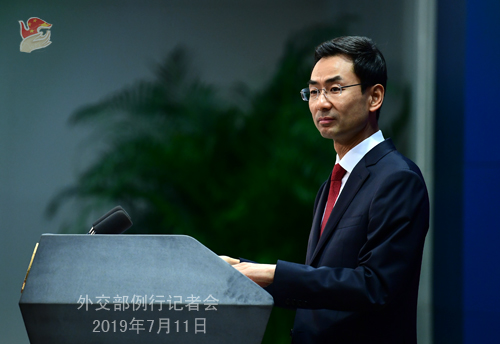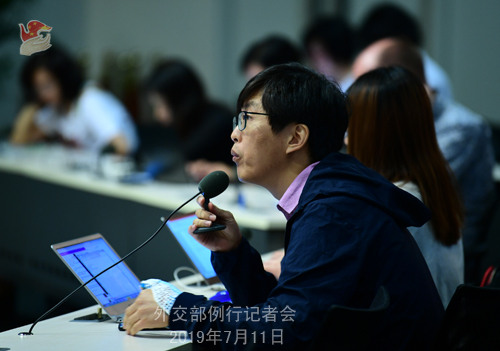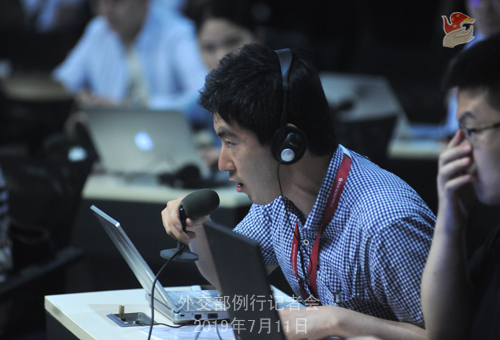| Foreign Ministry Spokesperson Geng Shuang's Regular Press Conference on July 11, 2019 |
| 2019-07-11 19:45 |
|
Q: Yesterday 22 countries wrote a letter to the UN Human Rights Council criticizing China's Xinjiang policy. President Caputova of Slovakia criticized China's human rights record after a meeting with State Councilor and Foreign Minister Wang Yi. British Foreign Secretary Hunt at a forum expressed concerns over the "deteriorating" human rights situation in China. How do you respond to those remarks? A: In this letter, certain countries wantonly criticized and smeared China in total disregard of the truth. By blatantly politicizing the issue of human rights, they have grossly interfered in China's internal affairs. We deplore and resolutely oppose that. We have made stern representations to those countries. We urge them to respect facts, reject bias, stay committed to the purposes and principles of the UN Charter, and stop politicizing the issue of human rights and interfering in China's internal affairs under the pretext of Xinjiang-related issues. As we repeatedly emphasized, Xinjiang affairs are China's internal affairs. They are a matter of China's sovereignty, security and territorial integrity. On Xinjiang-related issues, no one is in a better position to judge than the Chinese government and people. They brook no foreign interference. Faced with severe threats of terrorism and extremism, the Xinjiang Uyghur Autonomous Region has taken a series of counter-terrorism and de-radicalization measures according to law, including the establishment of vocational education and training centers. Those measures have turned the situation around. In the past more than two years, not a single violent and terrorist incident took place in Xinjiang. The region now enjoys social stability and unity among all ethnic groups. People there are living a happy life with a stronger sense of fulfillment and security. They endorse the government's policies and measures wholeheartedly. We also invited many groups of foreign diplomats, journalists, experts and scholars to visit Xinjiang and see with their own eyes the place as it is. All of them said the Xinjiang they saw was completely different from what had been described by Western media. We also offered invitation to the UN High Commissioner's Office for Human Rights. We welcome those with a truly objective and fair attitude to visit Xinjiang. But at the same time, we oppose any foreign forces that interfere in China's internal affairs and undermine China's sovereignty and territorial integrity under the pretext of Xinjiang-related issues. Now on the Slovak president's remarks, State Councilor and Foreign Minister Wang Yi has just paid a visit to Slovakia. He and Slovak leaders had candid and in-depth exchange of views on issues of mutual concern, including China-Slovakia bilateral relations. You can find more details in our press release. President Caputova commended China's major progress in development. She said that Slovakia attaches high importance to its relationship with China. She emphasized that Slovakia respects China's sovereignty and territorial integrity and will stay committed to the one-China principle. Taking the 70th anniversary of diplomatic ties as an opportunity, both sides agreed to enhance mutual political trust, communication and cooperation for a sound and stable bilateral relationship on the basis of mutual respect and equality. State Councilor Wang Yi talked about China's human rights, ethnic minorities and religious policies. He shared China's enormous achievements in these areas as well as relevant facts. The two sides agreed to conduct equal-footed and constructive dialogue on the basis of mutual respect. The visit has realized its intended purpose of carrying forward friendship, reconstructing mutual trust and promoting cooperation. On the statement by the British Foreign Secretary, frankly speaking, I have not seen Mr. Hunt's remarks. But I have noted that currently in the UK, competition for the Conservative Party leadership is ongoing. Many are working on their campaigns with an eye on the Conservative leadership and then perhaps the new Prime Minister. This is Britain's domestic affairs. But I hope certain people in the UK, including Mr. Hunt, will refrain from making China an issue in their campaigns to win voters. Such calculations will be all in vain.
Q: Yesterday Kim Song Nam, First Vice Director of the International Department of the WPK, arrived in Beijing and Director-General Lu Kang of China's MFA Information Department arrived in Pyongyang. Could you share with us the purposes and arrangements for these two visits? Will the two sides talk about DPRK-US negotiations? A: This year marks the 70th anniversary of the establishment of diplomatic relations between China and the DPRK. The visit by the International Department of the Workers' Party of Korea (WPK) is normal exchange between the two parties' international departments. Director-General Lu Kang of the MFA Information Department is leading a delegation to the DPRK to hold consultations with his counterpart. This is an exchange and mutual visit mechanism between the two countries and a normal exchange between the two ministries. Q: During the visit to China by Kim Song Nam, First Vice Director of the International Department of the WPK, will he inform the Chinese side of the meeting between the DPRK and the US leaders? Will Chairman Kim Jong Un's visit to China be discussed? A: As I just said, the visit is a normal exchange between the two parties' international departments. Please follow up on more information.
Q: There were reports that boats of Iran's Islamic Revolutionary Guard Corps attempted to seize a UK oil tanker in the Strait of Hormuz yesterday. Iran's foreign ministry and Islamic Revolutionary Guard Corps have denied this accusation. I wonder if you have any comment on this? A: I will need to check on that. As a principled response, the Gulf region is of great significance to international energy supply and global security and stability. We hope relevant sides will remain calm, exercise restraint, take concrete measures to prevent escalation and jointly uphold peace and stability in the region.
|
 |
|



